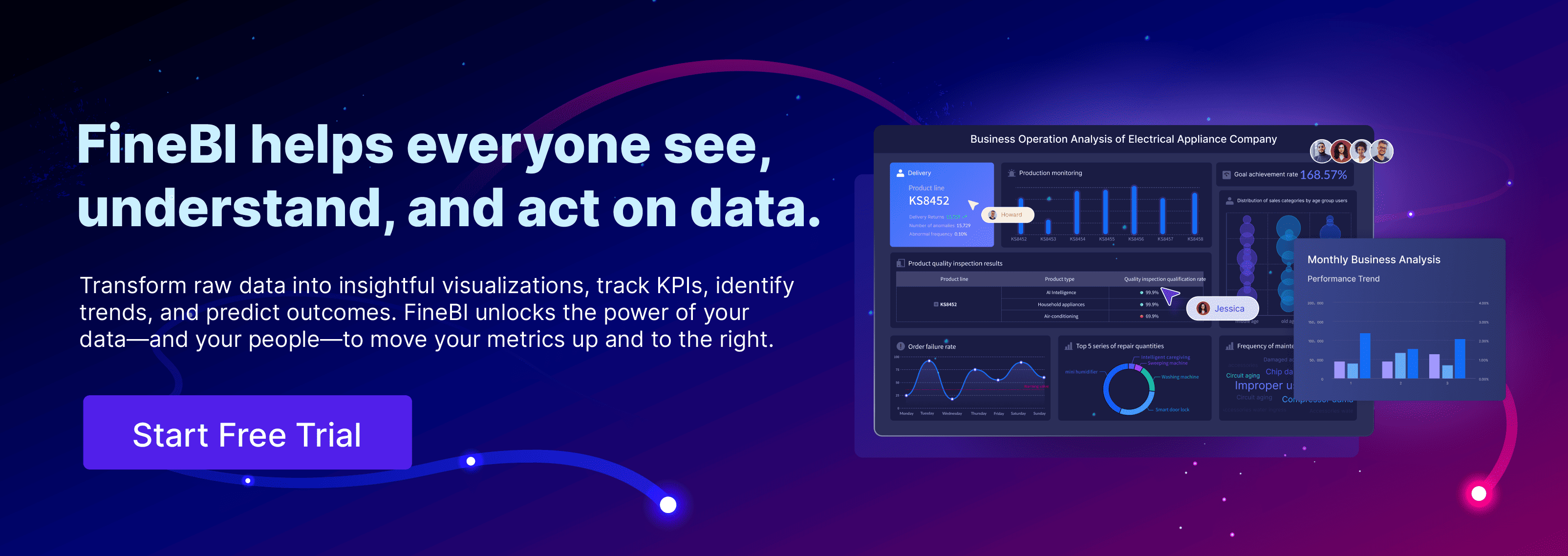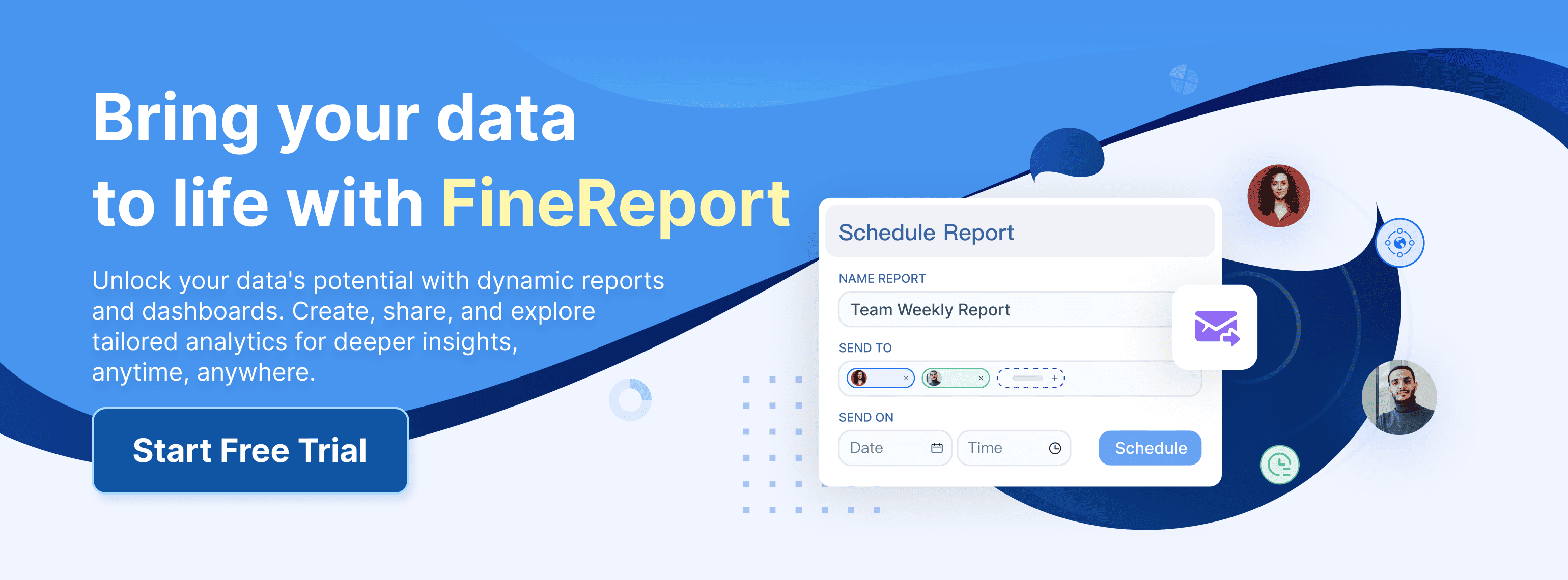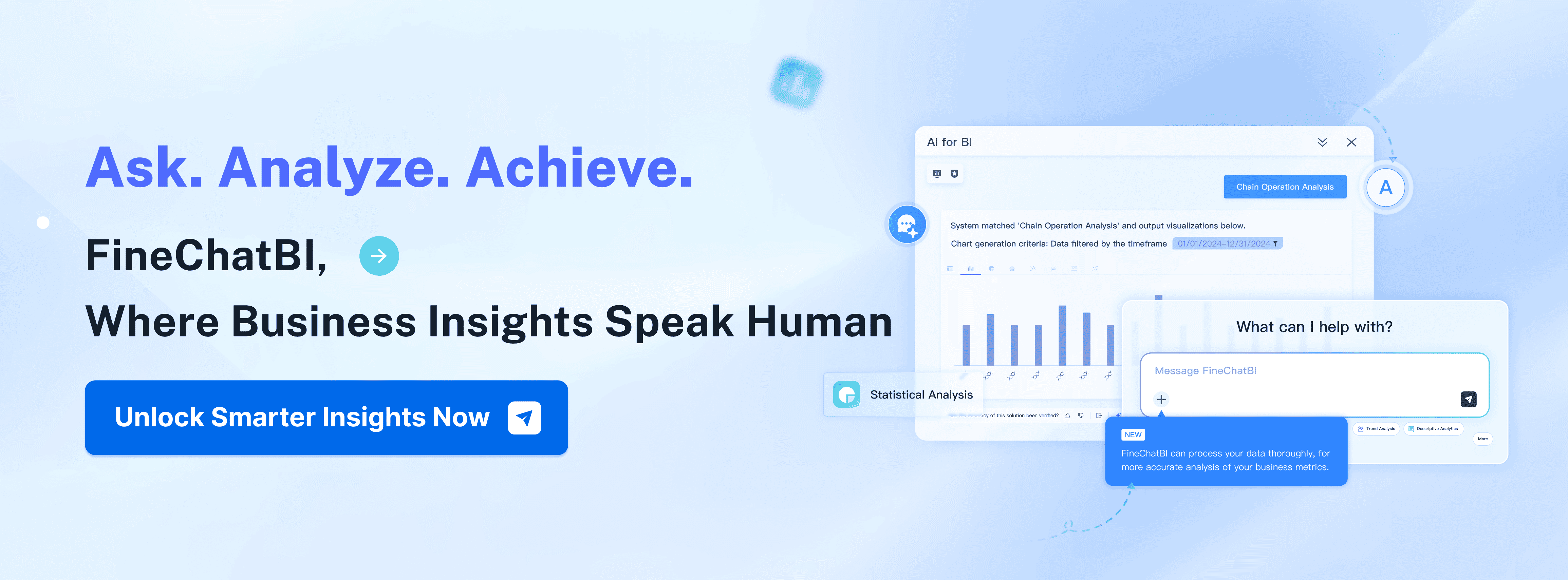Are you curious about what a data analyst in Chicago can expect to earn in 2025? The average data analyst salary is estimated at $85,131 annually, combining base pay and additional perks. Interestingly, some sources, like Glassdoor, report averages closer to $85,000, while Salary.com lists it as high as $109,000. Based on 3,667 salaries, another study even suggests $86,820 as the average. These figures highlight Chicago's competitive edge, driven by its booming tech and business sectors. Whether you're starting out or advancing your career, Chicago offers exciting opportunities for data analysts.

Key Takeaways on Data Analyst Salary
- Salary Range in Chicago: In 2025, data analysts in Chicago may earn an average of $85,131, with beginners around $68,250 and experts up to $121,371.
- Additional Earnings: Bonuses and benefits can add $9,083, bringing total pay to $87,757, surpassing the national average.
- Career Growth Tips: Learning Fanruan‘s tools like FineBI and FineReport, networking, and advocating for fair pay can enhance skills and job opportunities.
Average Data Analyst Salary in Chicago in 2025
Base Salary Overview
When you look at the numbers, the average base salary for a data analyst in Chicago is $78,674. This figure reflects the core earnings before bonuses or other perks. If you're just starting out, you might earn around $68,250 annually. On the other hand, experienced professionals can see salaries soar to $121,371. These numbers highlight the wide range of opportunities available, depending on your experience and skills.
Here’s a quick breakdown of the salary components:
| Salary Component | Amount |
|---|---|
| Average Salary | $78,674 |
| Entry-Level Salary | $68,250 |
| Experienced Salary | $121,371 |
| Average Additional Cash | $9,083 |
| Average Total Compensation | $87,757 |
As you can see, the average base salary forms the foundation of your earnings, but there’s more to consider when calculating your total compensation.
Additional Compensation (Bonuses, Benefits, etc.)
Beyond the base salary, additional compensation plays a big role in boosting your overall earnings. On average, data analysts in Chicago receive $9,083 in extra cash annually. This includes bonuses, profit-sharing, and other incentives. When you add this to the base salary, the average total compensation climbs to $87,757.
The perks don’t stop there. Many companies offer benefits like health insurance, retirement plans, and paid time off. These extras can significantly enhance your overall package. For senior data analysts, bonuses and benefits often make up a larger portion of their earnings, reflecting their higher responsibilities and contributions.
Here’s another perspective on how salaries vary by experience level:
| Experience Level | Average Salary | Salary Range |
|---|---|---|
| Data Analyst | $87,000 | $50,000 - $87,000 |
| Entry Data Analyst | $75,201 | $67,601 - $84,701 |
| Senior Data Analyst | $111,501 | $88,385 - $135,382 |
These figures show how your career progression can directly impact your earnings. Whether you’re just starting or already a senior professional, there’s room to grow.
Salary Trends Over the Past Few Years
Recent data analyst salaries in Chicago have shown a steady upward trend. A few years ago, the average salary for a data analyst in the city was $95,521 per year. This is significantly higher than the national average of $63,530. The rise in salaries reflects the growing demand for data analytics across industries. Companies are increasingly relying on data analysts to drive decisions, optimize operations, and stay competitive.
Here are some key trends to note:
- The average salary for a data analyst in Chicago is $95,521 per year.
- This figure is much higher than the national average of $63,530.
- Salaries have risen steadily, showing the increasing value of data analytics in business.
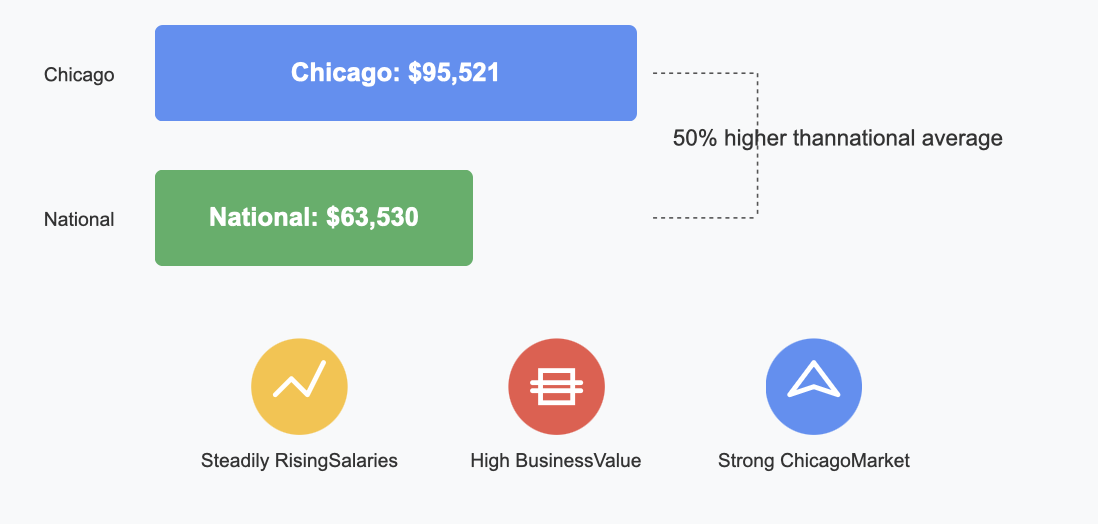
If you’re considering a career in data analytics, Chicago offers a promising landscape. The city’s thriving tech and business sectors ensure that skilled professionals remain in high demand.
Data Analyst Salary in Chicago by Experience Level
Entry-Level Data Analyst Salary
If you're just starting your career as a data analyst, Chicago offers a promising entry point. The average salary for entry-level data analysts in the city is $75,201. However, salaries typically range between $67,601 and $84,701, depending on your skills and the company you join. While the base salary is solid, the average total compensation, including bonuses and benefits, comes to $63,777.
Here’s a quick breakdown of entry-level salaries:
| Salary Type | Amount |
|---|---|
| Average Salary | $75,201 |
| Typical Salary Range | $67,601 - $84,701 |
| Entry-Level Average Compensation | $63,777 |
Starting out as a data analyst in Chicago means you'll gain valuable experience while earning a competitive salary. This is a great foundation for building your career in data analytics.
Mid-Level Data Analyst Salary
As you gain experience and move into mid-level roles, your earning potential increases significantly. In Chicago, mid-level data analysts earn an average salary of $86,565, according to Talent.com. Another source, TripleTen.com, reports an even higher average of $95,521. These figures reflect the growing demand for skilled professionals who can handle more complex data tasks.
Here’s how mid-level salaries compare across sources:
| Source | Average Salary |
|---|---|
| Talent.com | $86,565 (Based on 3649 salaries) |
| TripleTen.com | $95,521 |
Mid-level roles often come with additional responsibilities, such as managing projects or mentoring junior analysts. These roles not only boost your salary but also prepare you for senior-level positions.
Senior-Level Data Analyst Salary
Senior-level data analysts in Chicago enjoy some of the highest salaries in the field. With years of experience and advanced skills, you can expect to earn an average of $111,501 annually. Salaries for senior roles typically range from $88,385 to $135,382. These positions often involve leading teams, developing strategies, and working closely with executives to drive business decisions.
The financial rewards at this level reflect the value you bring to an organization. Beyond the paycheck, senior roles often include substantial bonuses and comprehensive benefits packages, making them highly rewarding both professionally and financially.
Tip: To reach senior-level positions faster, focus on upskilling and gaining certifications in Fanruan‘s tools like FineBI and FineReport. These tools enhance your data visualization and analysis capabilities, making you a more valuable asset to employers.
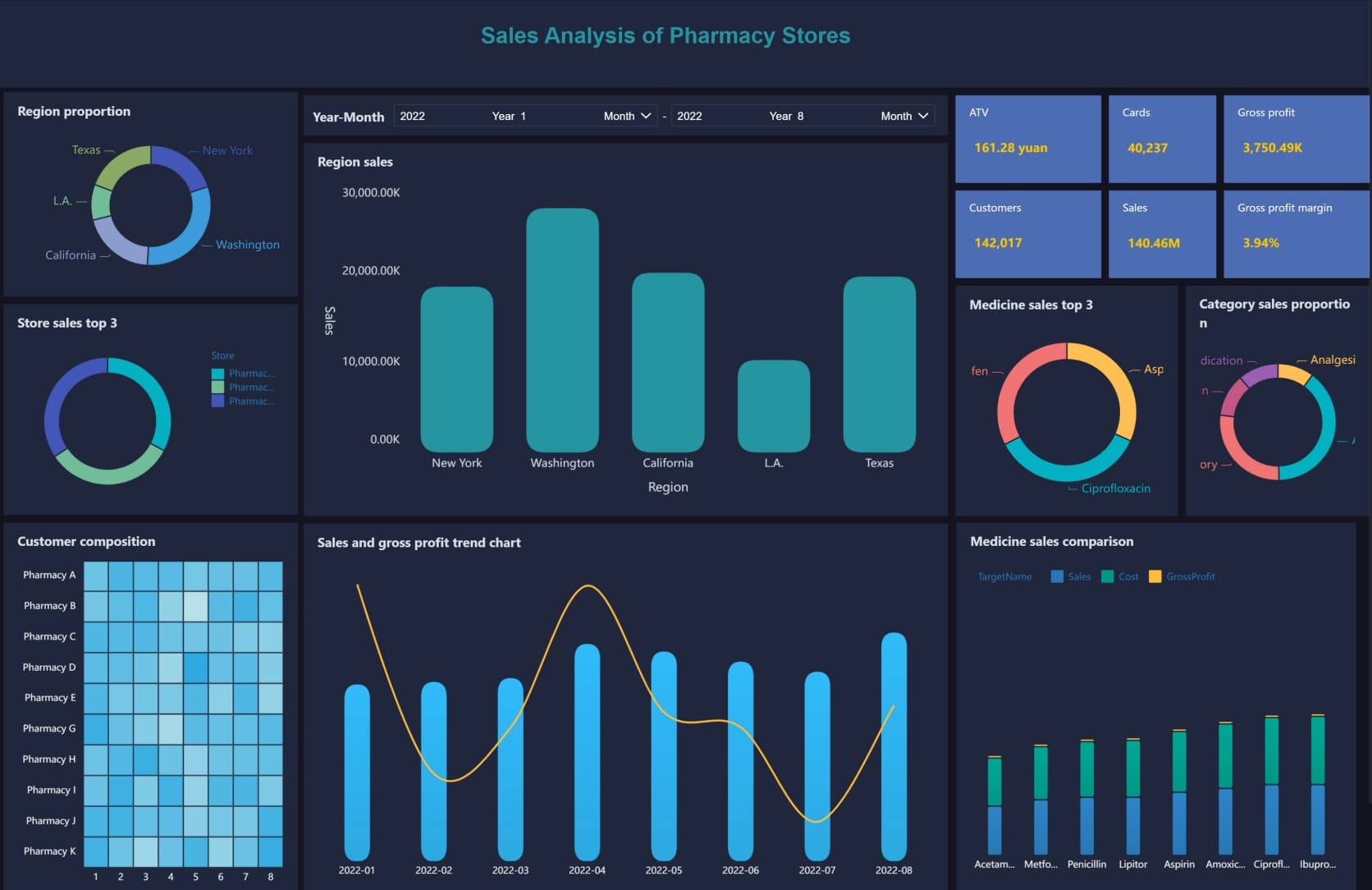
By understanding the data analyst salary by years of experience, you can plan your career path and set realistic goals. Whether you're just starting out or aiming for a senior role, Chicago offers a wealth of opportunities for growth.
Data Analyst Salary in Chicago by Gender and Diversity
Gender Pay Gap in Data Analytics
Have you ever wondered if gender affects how much a data analyst earns? Unfortunately, the gender pay gap remains a reality in many industries, including data analytics. In Chicago, male data analysts tend to earn slightly more than their female counterparts. Studies show that men in this field often receive higher bonuses and additional compensation, even when their base salaries are similar to women’s.
Why does this happen? Some experts point to differences in negotiation strategies or the types of roles men and women pursue. For example, men might be more likely to take on leadership roles or specialize in high-demand areas like machine learning. These factors can lead to higher pay.

But don’t let this discourage you. Many companies in Chicago are actively working to close the gender pay gap. They’re implementing transparent salary structures and offering mentorship programs to support women in data analytics. If you’re entering this field, knowing your worth and advocating for fair pay can make a big difference.
💡 Tip: When negotiating your salary, research industry benchmarks and highlight your unique skills. Fanruan‘s tools like FineBI can help you stand out by showcasing your expertise in data visualization and analysis.
Diversity and Inclusion Impact on Salaries
Diversity and inclusion aren’t just buzzwords—they’re game-changers in the workplace. In Chicago, companies that prioritize diversiperspectivesty often offer more competitive salaries to attract top talent. This is especially true for data analysts, as diverse teams bring unique that drive better business decisions.
If you belong to an underrepresented group, you might wonder how this affects your earning potential. The good news is that many organizations are committed to creating equitable opportunities. They’re investing in training programs, offering scholarships, and partnering with initiatives that promote diversity in tech. These efforts not only help close salary gaps but also create a more inclusive environment for everyone.
Here’s a quick look at how diversity impacts salaries:
| Factor | Impact on Salary |
|---|---|
| Diverse Teams | Higher team performance and pay |
| Inclusive Policies | More equitable salary structures |
| Specialized Skills (e.g., BI tools) | Increased earning potential |
By joining a company that values diversity, you’re not just earning a paycheck—you’re contributing to a culture of innovation and inclusion. And if you’re looking to boost your skills, tools like FineReport can help you master data visualization, making you an even more valuable asset.
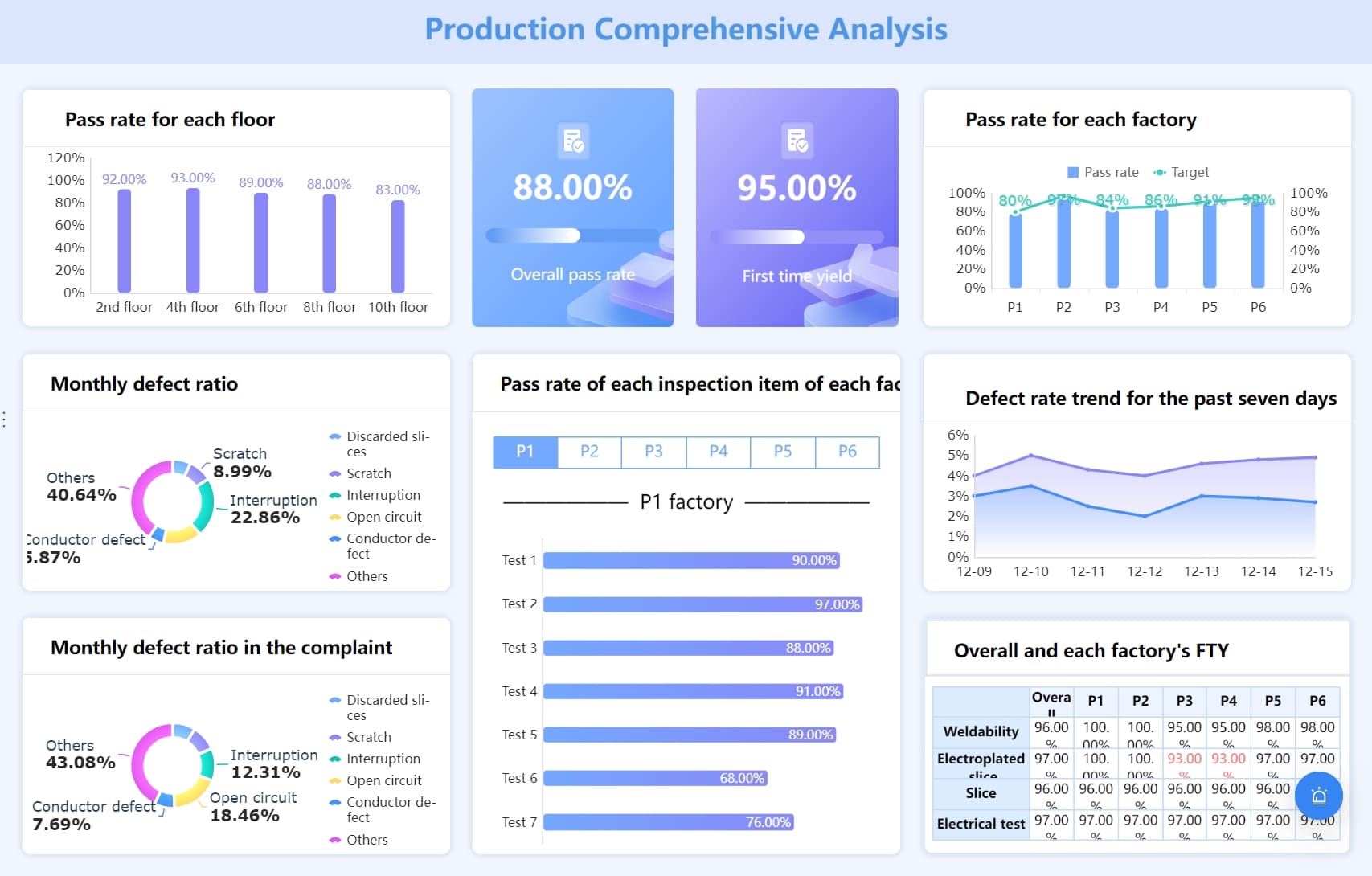
🌟 Note: Companies with strong diversity initiatives often see higher employee satisfaction and retention rates. Choosing the right employer can impact both your career growth and your overall happiness.
Data Analyst Salary in Chicago Compared to Other Locations
Chicago vs. Other Major U.S. Cities
When comparing Chicago to other major U.S. cities, you’ll notice that Chicago offers competitive salaries for data analysts. The average salary for a data analyst in Chicago ranges from $50,000 to $87,000 annually. This range reflects the city’s thriving tech and business sectors, which create a high demand for skilled professionals.
Chicago’s salary range is attractive, especially when you consider the city’s cost of living compared to places like New York or San Francisco. If you’re looking for a balance between earning potential and affordability, Chicago is a strong contender.
Chicago vs. National Average
How does Chicago compare to the national average? The difference is significant. The average salary for a data analyst in Chicago is $95,521 per year, while the national average sits at $63,530. That’s a gap of nearly $32,000!
This higher earning potential reflects Chicago’s robust job market and the increasing reliance on data analytics across industries. Companies in the city are willing to pay a premium for skilled data analysts who can help them make data-driven decisions.
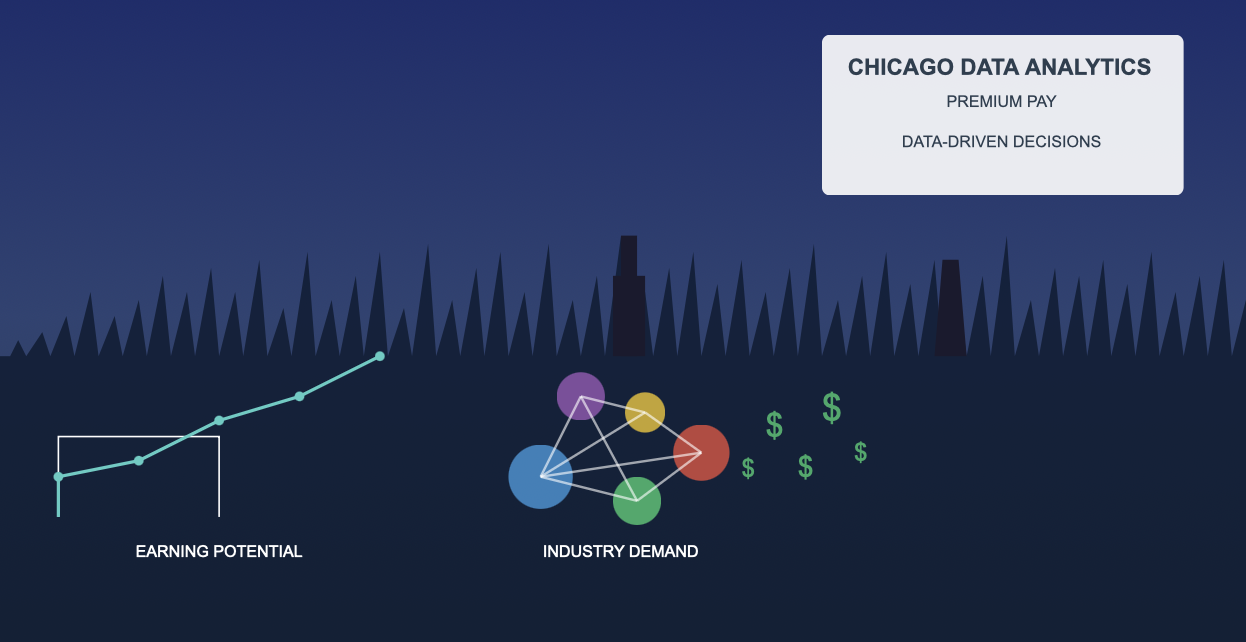
Here’s a breakdown:
- Average salary for a data analyst in Chicago: $95,521 per year
- National average salary for a data analyst: $63,530 per year
If you’re considering a career in data analytics, Chicago offers a clear financial advantage over many other locations in the U.S.
Chicago vs. Other States in the Midwest
Within the Midwest, Chicago stands out as a hub for data analysts. The city’s average salary of $95,521 far exceeds what you’ll find in nearby areas. For example, in Des Plaines, IL, the average salary is $61,046, while in Elgin, IL, it’s $60,150. Downers Grove, IL, offers an even lower average of $59,968.
Here’s a comparison of salaries across Illinois:
| Location | Average Salary |
|---|---|
| Chicago, IL | $95,521 |
| Des Plaines, IL | $61,046 |
| Elgin, IL | $60,150 |
| Downers Grove, IL | $59,968 |
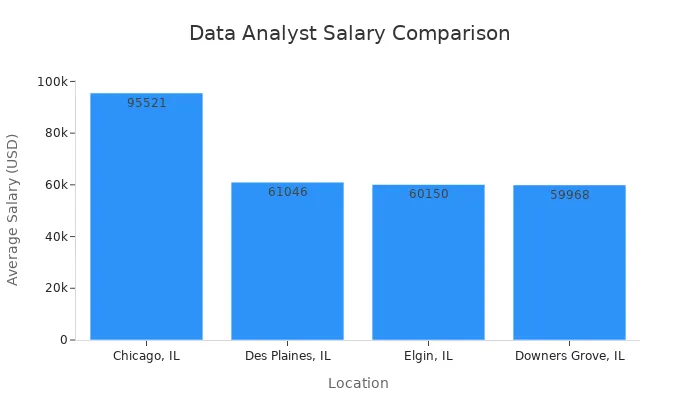
Chicago’s higher salaries reflect its position as a major economic and technological center in the Midwest. If you’re based in the region and want to maximize your earning potential, Chicago is the place to be.
💡 Tip: To stand out in Chicago’s competitive market, consider upskilling with tools like FineBI and FineReport. These tools can enhance your data visualization and analysis skills, making you a more attractive candidate to employers.
Factors Influencing Data Analyst Salary in Chicago
Demand for Data Analysts in Chicago
You’ve probably noticed how data is driving decisions everywhere—from marketing campaigns to healthcare innovations. This trend has created a strong demand for data analysts in Chicago. Companies across industries are looking for professionals who can turn raw data into actionable insights. Whether it’s a tech startup or a Fortune 500 company, businesses need skilled data analysts to stay competitive.
Chicago’s thriving business ecosystem adds to this demand. The city is home to major corporations, financial institutions, and a growing number of tech firms. These organizations rely on data analysts to optimize operations, improve customer experiences, and identify market trends. As a result, the job market for data analysts in Chicago is booming, offering plenty of opportunities for career growth.
💡 Tip: To stand out in this competitive market, consider specializing in high-demand areas like predictive analytics or machine learning. Tools like FineBI can help you sharpen your skills and make you a more attractive candidate.
Cost of Living in Chicago
Living in Chicago comes with its perks—world-class dining, vibrant culture, and stunning architecture. But it also comes with a price tag. The cost of living in Chicago is 12.4% higher than the national average. This includes expenses like housing, transportation, and groceries, which can add up quickly.
Here’s how the cost of living impacts salaries:
- The average salary for a data analyst in Chicago is $95,521 per year, significantly above the national average of $63,530.
- High living expenses push companies to offer competitive salaries to attract and retain top talent.
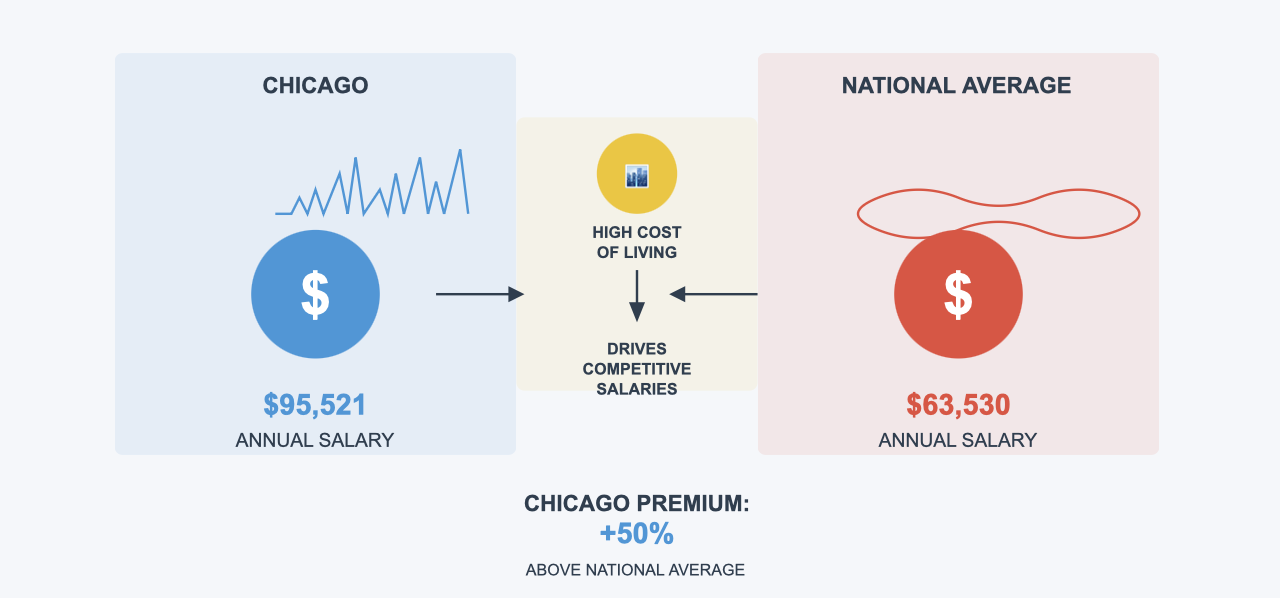
While the higher salaries are appealing, it’s essential to budget wisely. If you’re planning to move to Chicago for a data analyst role, consider researching neighborhoods and commuting options to manage your expenses effectively.
🌟 Note: Higher salaries in Chicago reflect the city’s economic vibrancy. However, balancing your income with living costs is key to enjoying all that the city has to offer.
Required Skills and Certifications
To land a well-paying data analyst job in Chicago, you’ll need more than just a degree. Employers value practical skills and certifications that demonstrate your expertise. Here’s what you should focus on:
- Technical Skills: Proficiency in tools like SQL, Python, and Excel is a must. Familiarity with data visualization platforms like FineBI and FineReport can give you an edge.
- Analytical Thinking: Employers look for candidates who can interpret data and provide actionable recommendations.
- Certifications: Earning certifications like Microsoft Certified: Data Analyst Associate or Google Data Analytics Professional Certificate can boost your credibility.
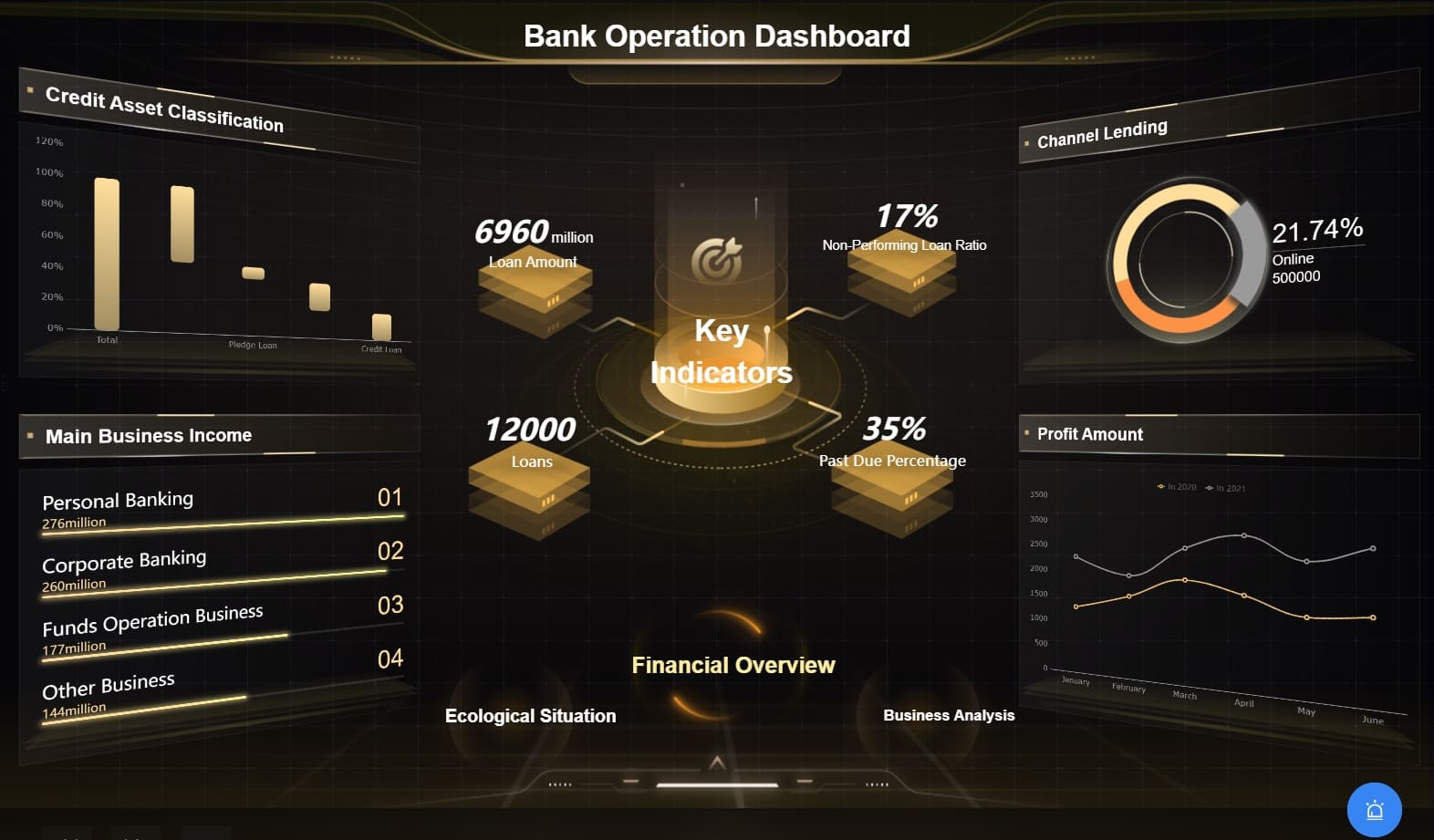
Investing in these skills not only increases your earning potential but also opens doors to more advanced roles. Certifications show employers that you’re committed to staying updated in a fast-evolving field.
💡 Tip: Upskilling with tools like FineBI can enhance your data visualization capabilities, making you a standout candidate in Chicago’s competitive job market.
Role of Fanruan‘s tools like FineBI and FineReport in Enhancing Skills
If you want to stand out as a data analyst in Chicago, mastering tools like FineBI and FineReport can give you a huge advantage. These tools are designed to make data analysis and visualization easier, even if you’re not a tech expert. They help you work smarter, not harder, by simplifying complex tasks and boosting your productivity.
Why FineBI is a Must-Have for Data Analysts
FineBI is like your personal assistant for data analysis. It’s user-friendly and doesn’t require coding skills, which makes it perfect for beginners. With FineBI, you can:
- Connect to multiple data sources: Whether it’s Excel, SQL databases, or big data platforms, FineBI integrates them all in one place.
- Create stunning dashboards: Drag-and-drop features let you build dashboards that showcase your insights clearly.
- Perform real-time analysis: Get instant updates as your data changes, so you’re always working with the latest information.
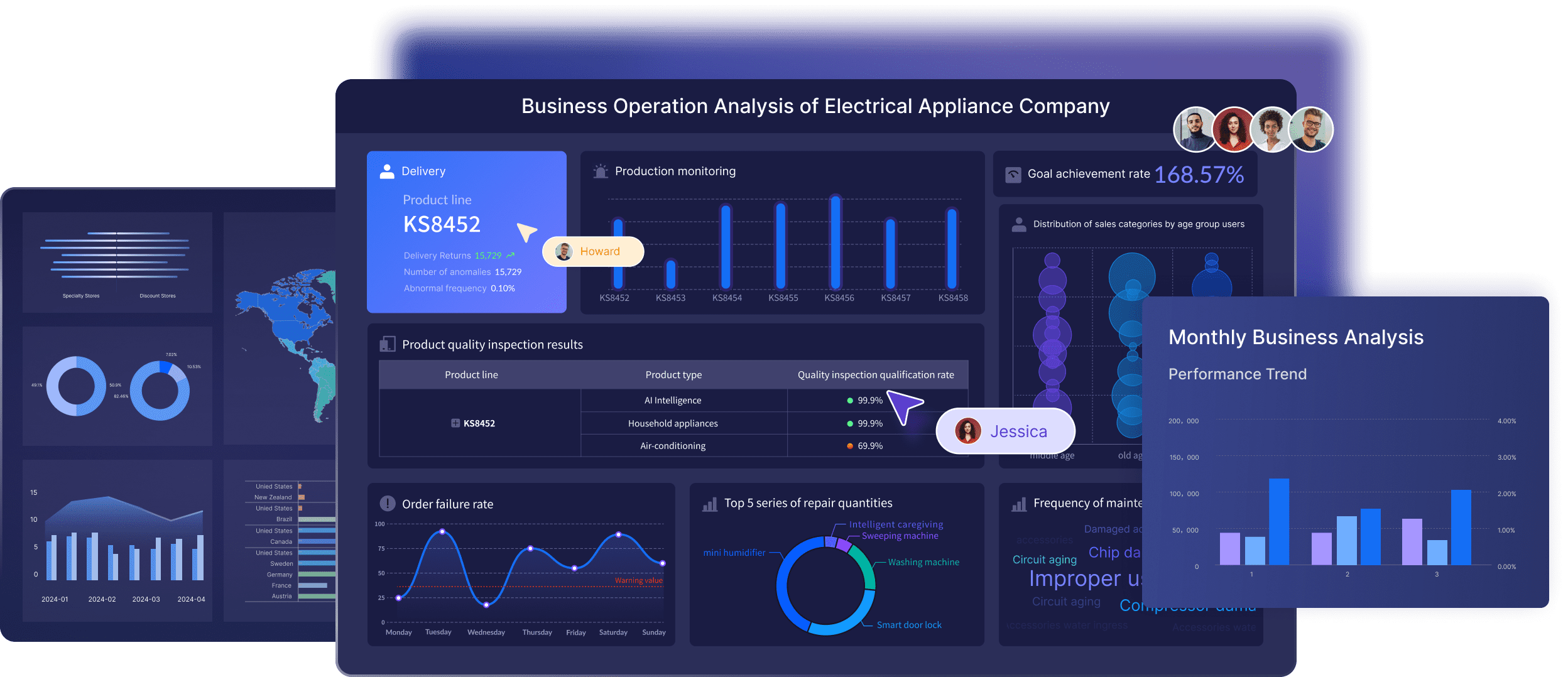
Imagine presenting a report where every chart updates in real-time. That’s the kind of impression FineBI can help you make. It’s not just about doing your job; it’s about doing it better than anyone else.
💡 Tip: Use FineBI’s OLAP analysis feature to drill down into your data and uncover trends that others might miss. This skill can set you apart in job interviews or performance reviews.
How FineReport Takes Your Visualizations to the Next Level
FineReport is all about storytelling with data. It helps you turn raw numbers into visuals that anyone can understand. Here’s what you’ll love about it:
- Zero-code interface: You don’t need to write a single line of code to create professional-grade visualizations.
- Dynamic 3D charts: Impress your audience with interactive 3D visuals that bring your data to life.
- Real-time analytics: Like FineBI, FineReport ensures your visuals are always up-to-date.
You can try it out in the FineReport demo model below:
Think about presenting a 3D Sankey diagram that shows how resources flow through a project. Tools like FineReport make this possible, and they make you look like a pro.
🌟 Note: Mastering FineReport can help you communicate complex ideas more effectively. This skill is invaluable when working with teams or presenting to executives.
By learning Fanruan‘s FineBI and FineReport, you’re not just improving your technical skills. You’re also becoming a better communicator and problem-solver. These tools can help you land higher-paying roles and advance your career faster. So, why wait? Start exploring them today and take your data analysis game to the next level.
Tips to Increase Your Data Analyst Salary in Chicago
Upskilling and Certifications
If you want to boost your salary as a data analyst, upskilling is one of the best ways to do it. Employers value professionals who stay updated with the latest tools and techniques. Start by identifying the skills that are in demand. For example, learning programming languages like Python or R can make you stand out. Mastering SQL is also essential since it’s widely used for managing databases.
Certifications can also give your career a big push. Consider earning credentials like the Microsoft Certified: Data Analyst Associate or Google Data Analytics Professional Certificate. These certifications show employers that you’re serious about your role and have the expertise to back it up. Tools like FineBI and FineReport can also help you sharpen your data visualization skills, which are highly valued in the industry.
💡 Tip: Dedicate a few hours each week to learning something new. Online platforms like Coursera or LinkedIn Learning offer courses that fit into your schedule.
Networking and Professional Development
Networking isn’t just about meeting people; it’s about building relationships that can open doors. Attend local meetups, conferences, or workshops in Chicago. These events are great for connecting with other data analysts and learning about job opportunities. You never know when a casual conversation might lead to your next big break.
Joining professional organizations can also help. Groups like the Chicago Chapter of the Data Science Association often host events and webinars. These are excellent opportunities to learn from industry leaders and stay updated on trends. Don’t forget to keep your LinkedIn profile active. Share your projects, engage with posts, and connect with professionals in your field.
🌟 Note: Networking isn’t just about taking—it’s about giving too. Share your knowledge and help others when you can. It builds goodwill and strengthens your connections.
Negotiation Strategies for Higher Pay
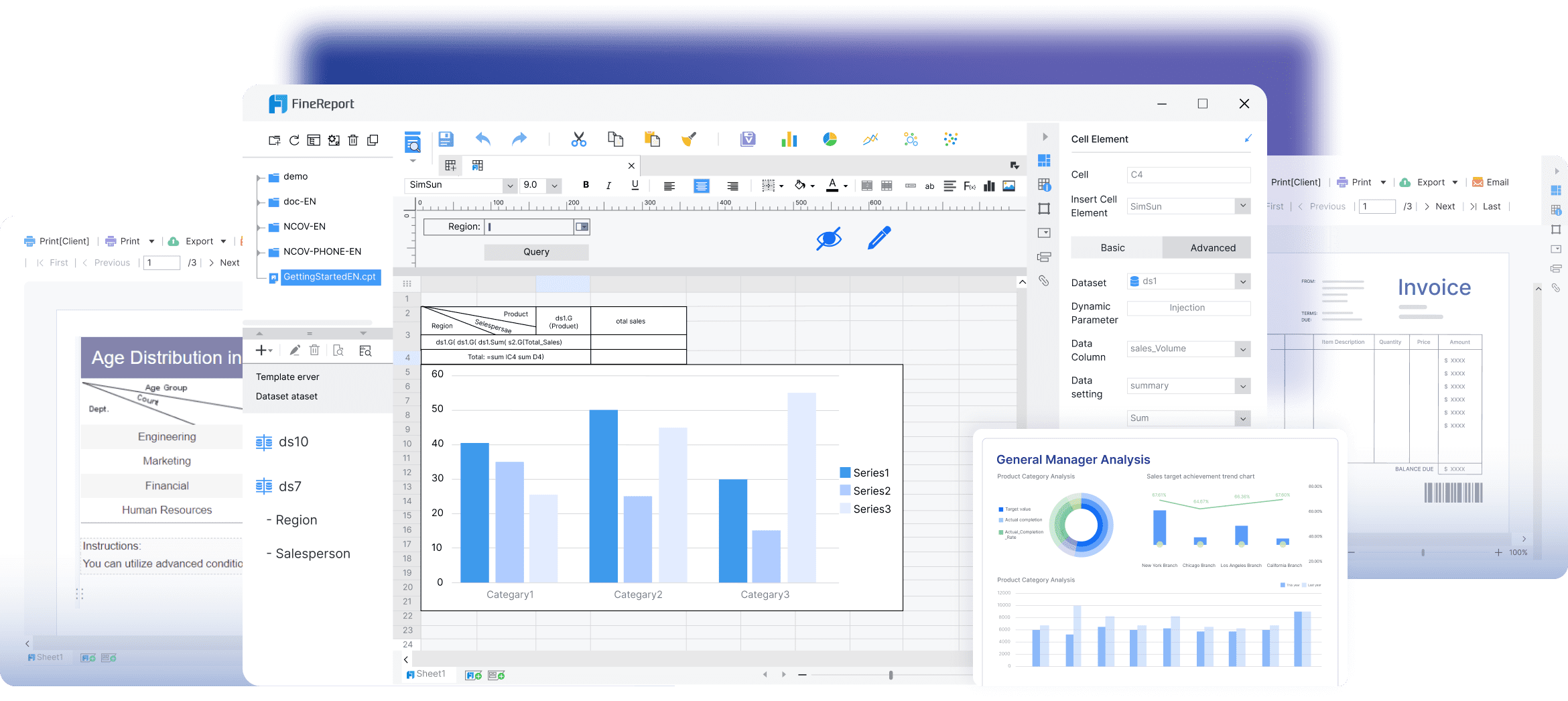
When it’s time to discuss your salary, preparation is key. Research the average pay for data analysts in your area. Knowing the market rate gives you a strong starting point. Websites like Glassdoor or Salary.com can provide reliable data.
During the negotiation, focus on the value you bring to the company. Highlight your achievements, such as successful projects or skills that save time and money. If you’ve mastered Fanruan‘s tools like FineBI or FineReport, mention how they’ve improved your efficiency or enhanced your team’s performance.
Don’t be afraid to ask for more. Many employers expect you to negotiate, so they often start with a lower offer. Be confident but polite. If the company can’t meet your salary expectations, consider negotiating for other perks like remote work options or additional vacation days.
💡 Tip: Practice your negotiation skills with a friend or mentor. The more comfortable you are, the better your chances of success.
Leveraging Tools like FineChatBI for Career Growth
If you’re looking to take your career as a data analyst to the next level, FineChatBI might just be the tool you need. This conversational business intelligence platform is designed to make data analysis faster, easier, and more insightful. But how exactly can it help you grow professionally? Let’s dive in.
Simplify Complex Data Analysis
FineChatBI turns complicated data queries into simple conversations. Imagine typing a question like, “What were the sales trends last quarter?” and getting a clear, visual answer in seconds. You don’t need to write code or spend hours digging through spreadsheets. This simplicity allows you to focus on interpreting results and making impactful decisions. Employers value analysts who can deliver insights quickly, and FineChatBI helps you do just that.
💡 Tip: Use FineChatBI’s Text2DSL feature to convert natural language into structured queries. It’s a game-changer for boosting your efficiency.
Build Trust with Transparent Results
One of the standout features of FineChatBI is its transparency. The tool lets you verify how it interprets your queries, ensuring accuracy and trustworthiness. This is especially important when presenting findings to stakeholders. When your results are clear and reliable, you build credibility within your team and organization. That credibility can open doors to leadership roles or special projects.
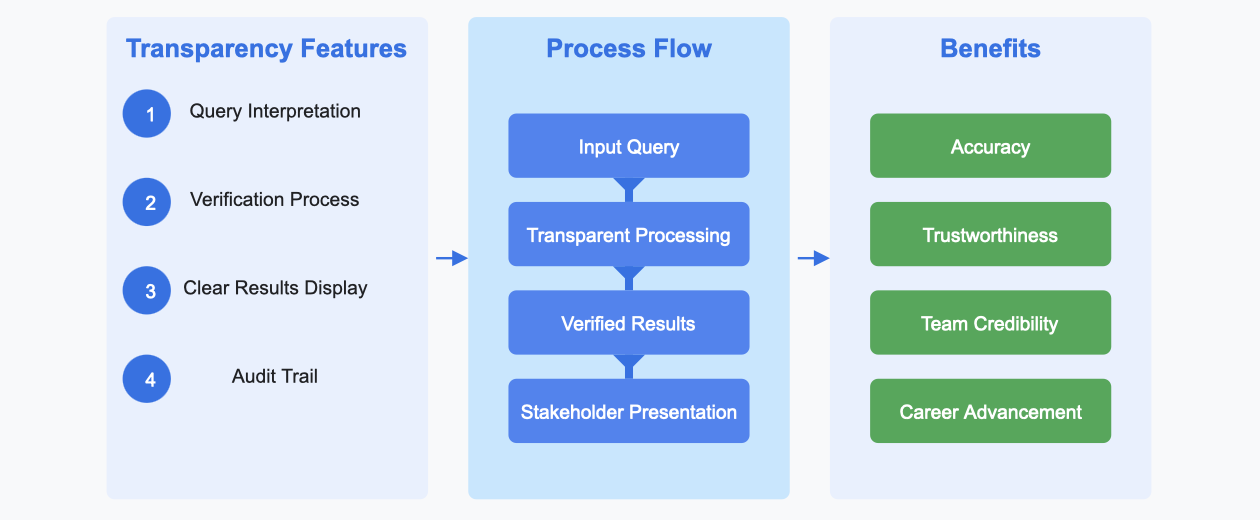
Master Advanced Analytics
FineChatBI doesn’t just stop at answering questions. It guides you through a complete analysis loop, from describing what happened to prescribing what actions to take. This capability helps you develop a deeper understanding of data trends and patterns. By mastering these advanced analytics, you position yourself as a strategic thinker—someone who doesn’t just analyze data but also drives business decisions.
Stay Ahead with Continuous Learning
The tech world evolves quickly, and staying updated is crucial. FineChatBI’s intuitive interface and advanced features make it an excellent tool for learning new skills. Whether it’s anomaly detection or prescriptive analysis, you’ll gain expertise that sets you apart from other analysts. Plus, using cutting-edge tools like FineChatBI shows employers that you’re proactive about staying ahead in your field.
🌟 Note: Companies love hiring analysts who bring innovative tools to the table. FineChatBI can be your secret weapon for standing out in job interviews.
By integrating FineChatBI into your workflow, you’re not just improving your day-to-day tasks. You’re also building a skill set that can lead to promotions, higher salaries, and exciting career opportunities. So why wait? Start exploring FineChatBI today and unlock your full potential as a data analyst.
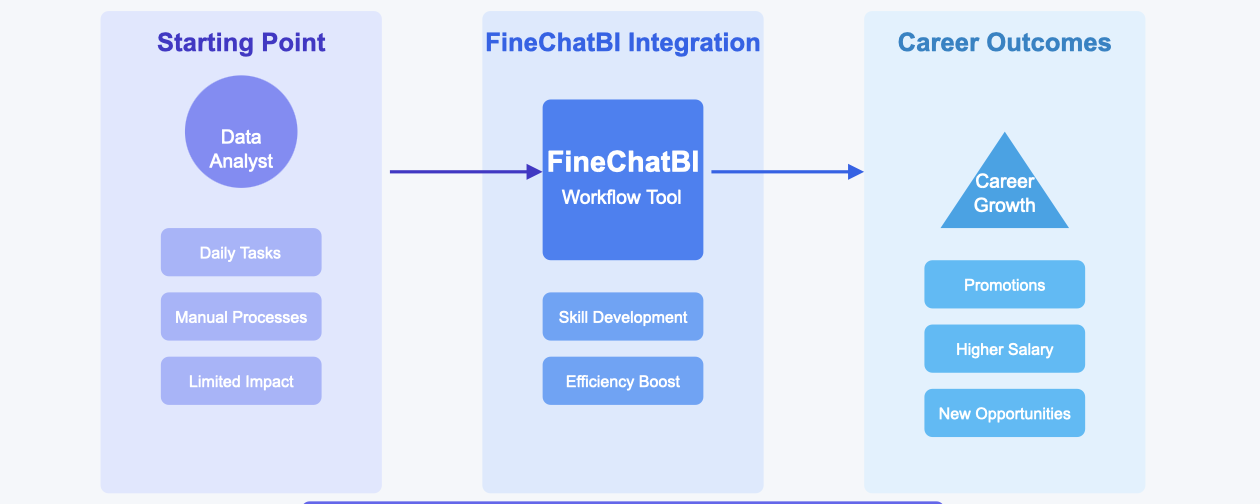
The data analyst salary in Chicago for 2025 highlights a competitive market with plenty of room for growth. Your experience, skills, and certifications play a big role in determining how much you can earn. Staying proactive and informed helps you maximize your potential. Tools like FineBI, FineReport, and FineChatBI can sharpen your skills and boost your career prospects. Whether you're just starting or aiming for senior roles, Chicago offers exciting opportunities for every data analyst.
Click the banner below to try FineBI for free and empower your enterprise to transform data into productivity!
Continue Reading About Data Analysis
How to Fix Data Analysis Excel Not Showing in 2025
What is SaaS Analytics and Why Businesses Need It
Top Beginner-Friendly Data Analysis Projects to Build Your Portfolio
Data Analysis vs Data Analytics: What’s the Real Difference?
What’s Topological Data Analysis? Simplify Data Secrets!
What is Retail Industry Data Analysis and Why It Matters
FAQs on Data Analyst Salary
1. What skills do you need to become a data analyst in Chicago?
You’ll need skills in SQL, Python, and Excel. Familiarity with data visualization tools like FineBI and FineVis is a big plus. Analytical thinking and problem-solving abilities are also essential. Certifications can further boost your profile.
2. How can you negotiate a higher salary as a data analyst?
Research salary benchmarks for your role and location. Highlight your achievements and unique skills during negotiations. Mention certifications or tools like FineBI that enhance your value. Be confident and prepared to discuss your contributions.
3. Are certifications necessary for a data analyst role?
Certifications aren’t mandatory, but they help. Credentials like Microsoft Certified: Data Analyst Associate or Google Data Analytics Professional Certificate show your expertise. They also make you stand out in a competitive job market.
4. What industries in Chicago hire the most data analysts?
Industries like finance, healthcare, retail, and tech hire many data analysts in Chicago. Companies in these sectors rely heavily on data-driven decisions, creating a strong demand for skilled professionals.
5. How does Chicago’s cost of living affect data analyst salaries?
Chicago’s cost of living is higher than the national average. Companies compensate by offering competitive salaries. While you’ll earn more, budgeting wisely ensures you enjoy the city’s perks without financial stress.
6. What tools should you learn to excel as a data analyst?
Master tools like SQL, Python, and Excel. For data visualization, FineBI and FineVis are excellent choices. They simplify analysis and help you present insights effectively, making you a valuable asset to employers.
7. Can entry-level data analysts earn bonuses in Chicago?
Yes, many companies offer bonuses even at entry-level. These can include performance-based bonuses, profit-sharing, or other incentives. Combined with benefits, they significantly enhance your total compensation.
8. How can FineChatBI help your career as a data analyst?
FineChatBI simplifies complex data queries and enhances your efficiency. Its transparency builds trust in your results. By mastering this tool, you’ll stand out as a forward-thinking analyst, ready to tackle advanced analytics.

The Author
Lewis
Senior Data Analyst at FanRuan
Related Articles
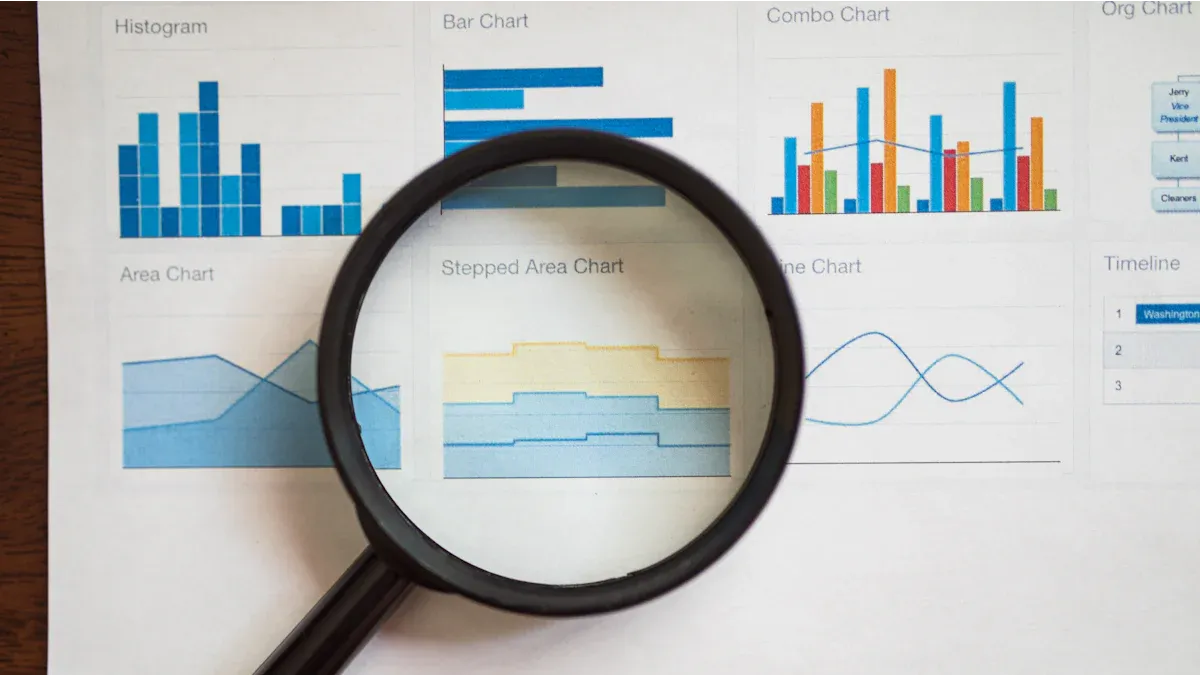
What is Distribution Analysis in Mathematics and Statistics
Distribution analysis in mathematics and statistics examines how data values spread, helping identify patterns and predict outcomes accurately.
Lewis
Dec 28, 2025

10 Best Retail Analytics Software Platforms for Retailers
Compare the 10 best retail analytics software platforms for retailers to boost sales, optimize inventory, and gain actionable customer insights.
Lewis
Dec 16, 2025
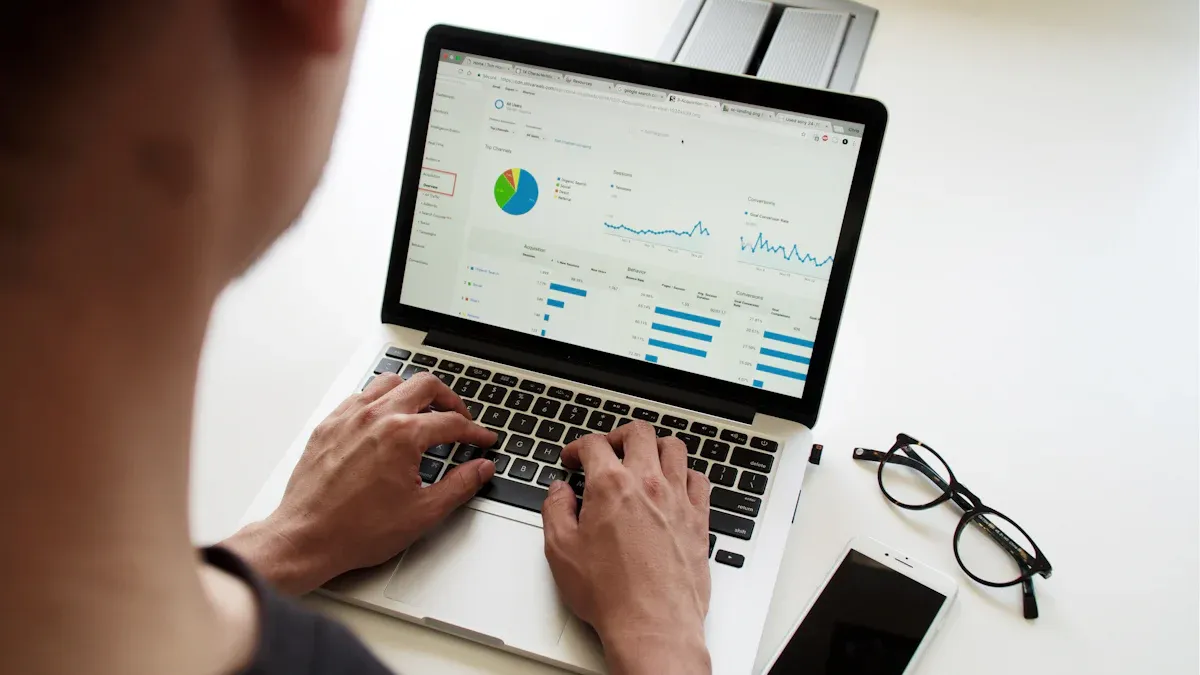
11 Best Tools for Research Analysis for Academics
Compare the 11 best tools for research analysis to boost academic and professional research efficiency, data management, and collaboration.
Lewis
Dec 11, 2025
